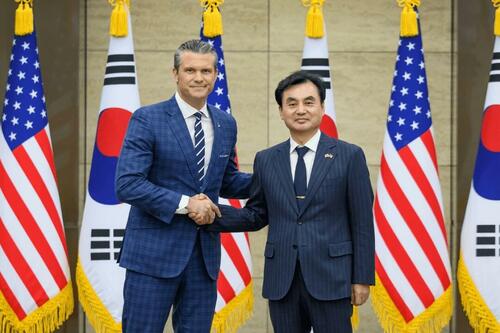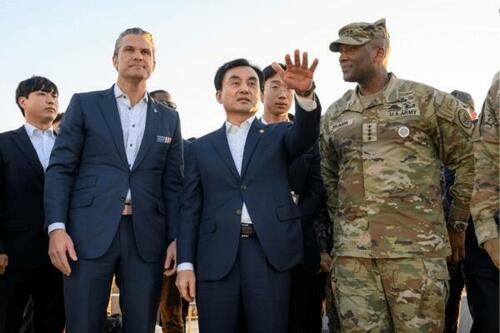Hegseth Says US-South Korea Alliance Will Stay Focused On Deterring North Korea
Authored by Victoria Friedman via The Epoch Times,
Secretary of War Pete Hegseth said on Nov. 4 that the U.S.–South Korean alliance will stay focused on deterring North Korea, but will also keep other regional threats in view.
After the annual security talks with his South Korean counterpart, Ahn Gyu-back, Hegseth told reporters, “There’s no doubt flexibility for regional contingencies is something we would take a look at, but we are focused on standing by our allies here and ensuring the threat of the DPRK is not a threat to the Republic of Korea and certainly continue to extend nuclear deterrence as we have before.”
DPRK stands for the Democratic People’s Republic of Korea, the official name for North Korea. The Republic of Korea (ROK) is the official name of South Korea.
Hegseth is in South Korea for a two-day visit. On Nov. 3, Ahn accompanied Hegseth to the demilitarized zone (DMZ) separating the two Koreas. The following day, he attended the 57th Security Consultative Meeting, the high-level defense meeting between the two allies.
“There was a reason why it was fitting that we went to the DMZ yesterday. It reminds you of the core of this alliance, that ultimately it’s holding the line and protecting our ally from the DPRK; it’s what we have been and continue to be oriented on,” Hegseth told reporters at the Ministry of National Defense in Seoul on Nov. 4.
“There are also a lot of threats in the world which we’re prepared for, and we’ve had a lot of good faith conversations, but centered around ensuring that the ROK is able to, as we move forward, work with them, lead the conventional defense here on the peninsula against North Korea.”
‘Model Ally’
In a speech to parliament earlier on Nov. 4, South Korean President Lee Jae Myung asked lawmakers to approve an 8.2 percent increase in defense spending, which he said would help modernize the country’s military weapons systems and reduce its reliance on the United States.
In his speech before taking questions from the press, Hegseth praised South Korea for working to increase its defense spending, which he said was critical to preserving peace, and if need be, to prevail in war.
Hegseth said that while he and Ahn acknowledge a dangerous security environment, their alliance is “stronger than ever.”
“Minister Ahn and I agreed to remain clear-eyed about the threats that we face, and that’s why we have to continue as we do every single day, as we saw at the DMZ with Korean and U.S. troops standing shoulder to shoulder, working together,” Hegseth said.
U.S. Secretary of War Pete Hegseth (2nd L) and South Korean Defense Minister Ahn Gyu-back (C) visit the Observation Post Ouellette near the border village of Panmunjom, South Korea, on Nov. 3, 2025. South Korea Defense Ministry via AP
“We need to increase our defense cooperation by taking a common sense approach that is grounded in realism, building on the strong leadership of our presidents—President Trump and President Lee—and President Trump wants allies to be strong, and the Republic of Korea is a model ally.”
The Pentagon chief said that during talks, he and his counterpart agreed that defense funds would be used to increase South Korea’s capabilities to lead a conventional deterrence against North Korea.
He also highlighted the defense cooperation to repair and maintain U.S. warships in South Korea, and that the United States is planning on extending its cooperation to maintain ground equipment in the country.
Nuclear-Powered Submarines
Hegseth also addressed the issue of nuclear-powered submarines, saying that the Pentagon would be working with the Department of Energy and the Department of State to fulfill Trump’s commitment to share sensitive nuclear propulsion technology with South Korea.
While Hegseth said he was not in a position to comment on the details that Trump had approved, he said that the U.S. president “wants allies to be strong. He wants our allies to have the best capabilities, and because Korea has been a model ally, he’s open to opportunities like that that ensure they have the best capabilities in their own defense and alongside us as allies.”
South Korea has no nuclear weapons, and Ahn said Seoul remains committed to the nuclear nonproliferation treaty.
When asked on Nov. 4 about whether South Korea would develop nuclear weapons, Ahn said, via a translator, that Seoul’s commitment to denuclearization on the Korean Peninsula “remains unwavering.”
He said that South Korea is a member of the Treaty on the Non-Proliferation of Nuclear Weapons and will not acquire or develop nuclear weapons.
In relation to whether Seoul would allow U.S. tactical nuclear weapons to be deployed from the peninsula, Ahn said, “As we are not going to develop our own nuclear weapon, there is a strong need for us to combine the use of Korea’s conventional forces and the United States’ nuclear capability, resulting in a conventional nuclear integration initiative.”
South Korea has committed $150 billion in U.S. shipbuilding investments, with a submarine slated for construction at the Hanwha Philly Shipyard, which is owned by South Korean conglomerate Hanwha Group.
Trump said in an Oct. 29 post on Truth Social that he had given Seoul approval to build a nuclear-powered submarine.
“South Korea will be building its Nuclear Powered Submarine in the Philadelphia Shipyards, right here in the good ol’ U.S.A. Shipbuilding in our Country will soon be making a BIG COMEBACK. Stay tuned!!!” Trump said in a follow-up post on Truth Social.




